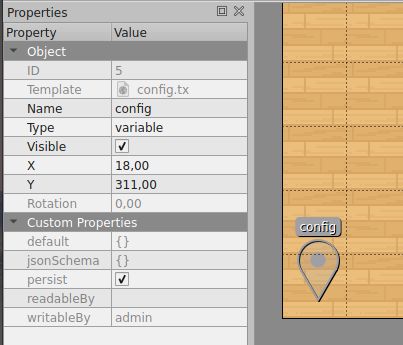2.9 KiB
{.section-title.accent.text-primary}
Variables
Maps can contain variables. Variables are piece of information that store some data. In computer science, we like to say variables are storing the "state" of the room.
- Variables are shared amongst all players in a given room. When the value of a variable changes for one player, it changes for everyone.
- Variables are invisible. There are plenty of ways they can act on the room, but by default, you don't see them.
Declaring a variable
In order to declare allowed variables in a room, you need to add objects in an "object layer" of the map.
Each object will represent a variable.

The name of the variable is the name of the object. The object type MUST be variable.
You can set a default value for the object in the default property.
Persisting variables state
Use the persist property to save the state of the variable in database. If persist is false, the variable will stay
in the memory of the WorkAdventure servers but will be wiped out of the memory as soon as the room is empty (or if the
server restarts).
{.alert.alert-info}
Do not use persist for highly dynamic values that have a short life spawn.
Managing access rights to variables
With readableBy and writableBy, you control who can read of write in this variable. The property accepts a string
representing a "tag". Anyone having this "tag" can read/write in the variable.
{.alert.alert-warning}
readableBy and writableBy are specific to the "online" version of WorkAdventure because the notion of tags
is not available unless you have an "admin" server (that is not part of the self-hosted version of WorkAdventure).
In a future release, the jsonSchema property will contain a complete JSON schema to validate the content of the variable.
Trying to set a variable to a value that is not compatible with the schema will fail.
Using variables
There are plenty of ways to use variables in WorkAdventure:
- Using the scripting API, you can read, edit or track the content of variables.
- Using the Action zones, you can set the value of a variable when someone is entering or leaving a zone
- By binding variable values to properties in the map
- By using automatically generated configuration screens to create forms to edit the value of variables
In general, variables can be used by third party libraries that you can embed in your map to add extra features. A good example of such a library is the "Scripting API Extra" library